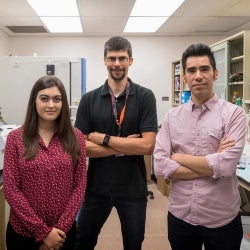
UVA neuroscientists, from left, Megan Chappell, Alban Gaultier and Anthony Fernández-Castañeda are now seeking ways to promote brain repair.
Cells that scientists have largely ignored when studying multiple sclerosis are actually key contributors to MS development, new research from the University of Virginia School of Medicine shows. The discovery suggests new avenues for devising treatments and is a vital step toward finding a cure.
In MS, the body’s immune system begins to attack the myelin, leading to a progressively disabling neurological condition that affects more than 2 million people worldwide. (MS is the most common neurological condition among the young, and it is often diagnosed between ages 20 and 50.)
It has been thought that these progenitors do not efficiently give rise to myelin-producing cells in people with MS. But UVA’s Alban Gaultier and his team made the surprising discovery that the cells are also actively participating in the immune system’s harmful attacks on myelin.
More info at UVAToday, 10/7/19
